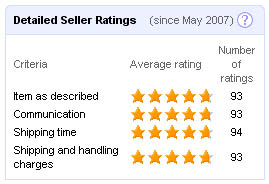EBay
eBay is an online auction and shopping environment in which people buy and sell a variety of items worldwide. It was founded in 1995 with the intention of being able to connect a diverse and passionate community of individual buyers, sellers, and small business owners. Both new and used items are available for purchase through auction or more directly with the "buy it now" feature. A wide variety of items are available in many different categories, such as fashion, motors, and electronics. Users can buy and sell anything from rubber bands to new and used cars.
Contents
History
eBay was founded in Pierre Omidyar's San Jose living room back in September 1995. From the start Ebay was meant to be a marketplace for the sale of goods and services for individuals. In 1998, Pierre and his cofounder Jeff Skoll brought in Meg Whitman to sustain the success. Meg had studied at the Harvard Business School and had learned the importance of branding at companies such as Hasbro. Meg culled her senior staff from companies such as Pepsico and Disney, created an experienced management team with an average of 20 years of business experience and built a strong vision for the company -- that eBay is a company that is in the business of connecting people, not selling them things. They quickly shed the image of only auctioning collectibles and moved into an array of upscale markets. By forging partnerships with namebrands such as GM, Disney and Sun, eBay has managed to continue growing and being successful. [1] As of 2010 the total value of goods sold on eBay was $62 Billion or about $2000 every second.
Types of Listings
There are a few main types of auctions that are available to buyers and sellers:
- Auction-style listings: The seller sets the starting price, and potential buyers are able to bid up until the end of the auction. The bidder with the highest bid will win the item. Sellers are also able to impose a reserve price, which is a price that needs to be reached in order for the item to sell.
- Fixed-price listings: A seller may choose to make a "Buy it Now" price, in which the buyer pays the fixed price and the auction ends immediately.
- Fixed-price listings with best offer: A seller may choose to add a "Best Offer" option along with the "Buy it Now" price. The seller has the opportunity to review potential buyers' offers before selling the item and ending the auction.
Trust
Seller Ratings
A huge part of selling on eBay is your seller rating, which is an indication of how good of a reputation you have as a seller. Starting price, communication skills, shipping cost, and handling time are a few factors that get taken into account when calculating seller ratings. Buyers leave feedback after transaction, on the basis of a positive, neutral, or negative experience. Furthermore, each individual category can get ranked from zero to five stars, five being the best and zero being the worst. Sellers can get different colored stars based on the number of positive ratings they have received, which shows potential buyers how reputable they are. You are able to be termed a "Power Seller" when you have a certain number of positive ratings, all above 4.5 stars.
PayPal
In 2002, eBay acquired PayPal for $1.5 billion dollars. Since then, the payment method of choice on eBay has been PayPal. eBay has implemented a number of payment safety features to ensure that customers on eBay are not taken advantage of. Using their proprietary fraud technology, PayPal automatically flags transactions that it thinks are suspicious. If a buyer on eBay is scammed or taken advantage by another user, PayPal often reimburses the buyer.
Ethical Implications
Some of the ethical issues on eBay include the buying and selling of counterfeit and pirated items, online identity theft, buyers not paying for items that they win, and sellers not sending items that a buyer has paid for. "The selling of pirated and counterfeit items is a big problem on eBay, particularly regarding computer products, collectibles, and designer watches, jewelry and clothing." [2] In recent years, eBay has implemented rules and a solution system to solve many of these problems but it is still difficult for them to control everything. Some Internet users do not feel comfortable buying or selling on eBay because of the aforementioned reasons.
Another ethical issue in eBay environment is when users leave negative feedback on a seller and negatively effect a sellers rating. This is known as feedback abuse and brings about an issue that is created because of the online anonymity which eBay as a store provides. [3]
Vigilantes
eBay Vigilantes have tried to take matters into there own hands by coming up with their own ways to fight against eBay criminals. "The most common tactics used by vigilantes are sending warning messages to bidders in what they believe is a scam auction, placing and then retracting a bid so they can warn others with a message that becomes part of the auction about why they retracted their bid, and creating a throw-away account so they can place winning bids and leave negative feedback without getting hurt by receiving negative feedback in return." [2]
Tiffany & Co. Lawsuit
eBay has been in a number of legal battles but one of the more prevalent ones involved the sale of counterfeit Tiffany & Co. products on eBay. It has been a major issue of concern for Tiffany & Co, so they decided to take action. "Earlier this year, the famous jeweler secretly purchased about 200 items from eBay and inspected them for authenticity. Three-quarters were obvious fakes, Tiffany said. That's an erosion of brand equity that Tiffany just couldn't stomach. The jeweler filed suit." [4] This is a major legal battle for eBay because other companies could use the precedence of this case to make a case for themselves. eBay has always used a "hands off" approach in governing their site, eBay often argues that "We are a marketplace. We are not a retailer. We don't own any of these products. We don't take possession of them." [4]
References
- ↑ Gomes-Casseres,Ben (2001). “The History of eBay”
- ↑ 2.0 2.1 Goldsborough, Reid (2003). “Fighting Back Against Online Auction Fraud - Personal Computing”
- ↑ http://reviews.ebay.com/Removing-Negative-Feedback-on-Ebay?ugid=10000000012401440
- ↑ 4.0 4.1 Sullivan, Bob (2004). “EBay fights its toughest legal battle: Tiffany lawsuit puts 'hands off' approach to the test”. http://www.msnbc.msn.com/id/6030048/ns/technology_and_science-security/t/ebay-fights-its-toughest-legal-battle/#.Tu4rOiPuZ4U




